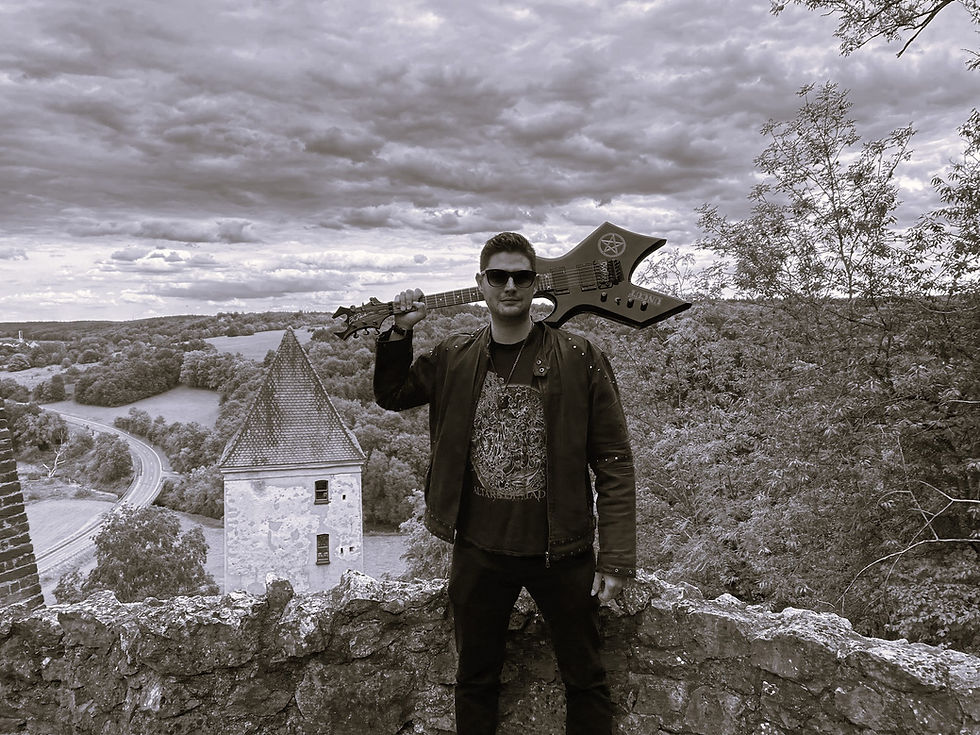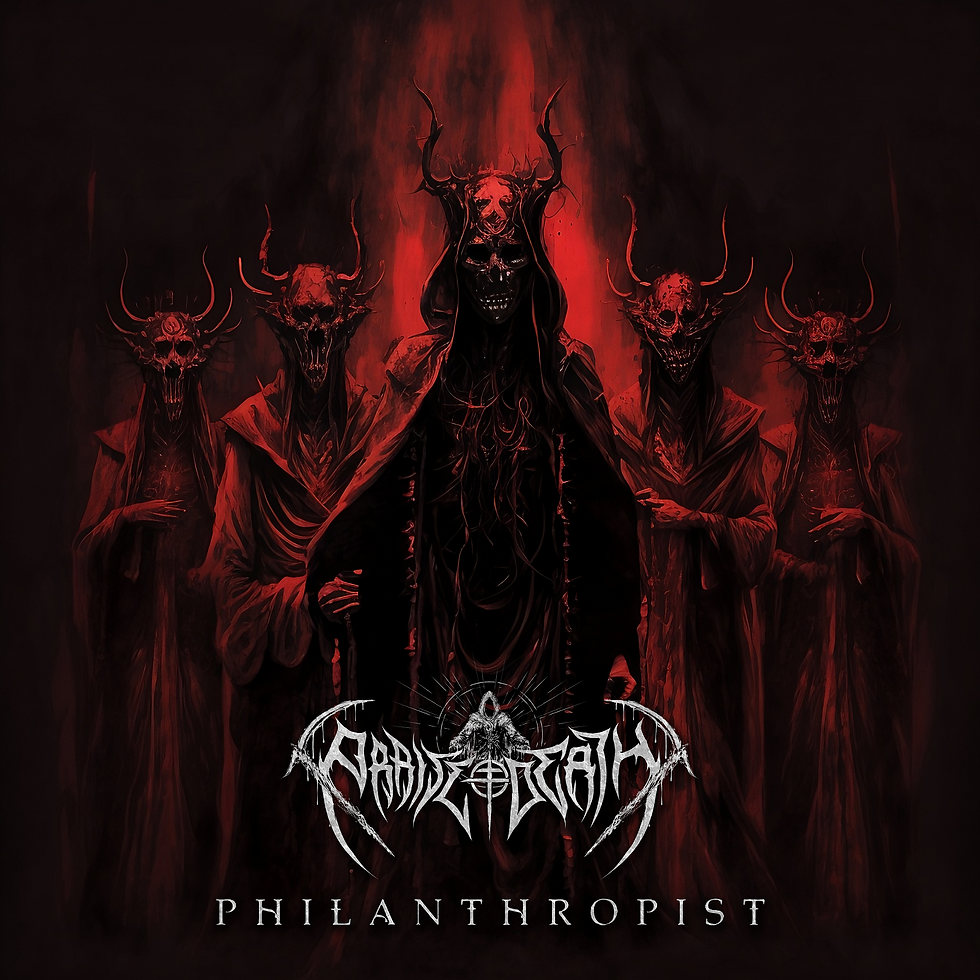Interview to PRAISE OF DEATH (Germany)
- rottenpages
- 17 oct 2024
- 6 Min. de lectura

1. Hello, my friend! It’s a pleasure to have you on Rotten Pages ‘zine. How are you doing today? Let’s set the scene first: Where do we find you right now? Please describe your surroundings.
Hi man, thanks for having me! My websites on Bandcamp (https://praiseofdeath.bandcamp.com/album/philanthropist) or Instagram (https://www.instagram.com/praiseofdeathofficial/) are the best ways to reach out to me. In addition, you can download the album Philanthropist on Bandcamp for a small fee and watch my music video for “Past Present and Future” on YouTube!
2. Being from Bavaria, Germany, how has your geographical location influenced your music and overall artistic direction as a band?
Germany is very open to all styles of music, be it metal or anything else. When I was a kid, I was lucky enough to watch Metallica’s St. Anger music video on MTV – from that moment on, I wanted to be a musician myself and just knew it had to be metal. As my musical journey continued, I came into contact with bands like Slayer and later Sinister, Death, Cannibal Corpse, Demilich, Necrophagist, and Broken Hope. I wouldn’t go so far as to assert that Bavaria as a geographical location particularly influenced me as a musician, but it’s a great place to live anyway.
3. What challenges and advantages do you experience as a one-man band?
First things first, I can compose my music and write the lyrics exactly how I want without any limitations. The biggest disadvantage, though, is that I obviously cannot perform live on stage without musicians, and that sucks. It’s really hard to find death metal musicians in my vicinity. I really want to start a band and get on tour with my music.
4. How have you developed and grown as a musician? What prompted you to explore death metal?
In death metal, everything is possible: diminished chords, weird scales, odd rhythms, low guitar tunings, etc. You can utilize everything that contributes to an evil guitar sound. The other aspect is writing morbid lyrics. It’s the stuff of nightmares that conveys, in combination with the music, a vast amount of energy. Only with death metal can I fully express myself – and that’s what it’s all about: self-expression.

5. Tell me more about the ambiance, mood, and recording conditions of your debut album, Philanthropist. How long did it take you to create the entire album from start to finish?
The funny thing about Philanthropist is that every song had already been written over 15 years ago when I was in high school. Note: The song “Odyssey” is indeed the only song I didn’t re-record, because, first, I wasn’t able to accurately reproduce the solo, and second, I liked the atmosphere anyway. I published a demo tape back then and gave it to my friends, receiving a lot of support. Over the years, I acquired better recording equipment and thought I should record all the songs again and publish them online, so the whole world could hear my music. The whole project was recorded in my home studio within three or four months; only the mastering took place in Chicago.
6. Did you have a ‘mission’ and goal when you first started out, or did the music and direction take shape as you crafted songs?
I didn’t know what to expect in the future. It was super exciting to get the whole recording process going, mixing and manipulating the sounds; but when the CD was finished, my knowledge of what to do next ended abruptly because I’m a musician first and not a marketing expert. This is where I struggled most, and I had to realize that you have to invest a lot of money to promote your songs online. It would have been much easier if I had found a record label that supported me, but that is naturally not an option for a newcomer.
7. What are the most challenging aspects of writing a song, and how do you approach it?
I never follow a strict plan. Sometimes I get inspired by listening to other bands, and sometimes I just play guitar and jot down riffs I like. Then I combine riffs, rewrite them, and so on; it’s sort of a snowball effect mixed with creativity. In the end, you also need a portion of experience (that comes over the years) and talent. To conclude, the most challenging aspect is maintaining motivation and finding time to play and write music. I also play flamenco guitar, which consumes all my energy to get good at that too. Hence, I always have to prioritize how much of my leisure time I dedicate to which instrument and musical genre.
8. With twelve distinctive tracks on the album, how do you ensure that each song stands out individually while also contributing to the overall flow and cohesiveness of the record?
To a certain extent, the lyrics contribute to the overall cohesiveness of the album. They deal with various topics, such as philosophy, myths, self-reflection, and diabolic themes. In the end, I had maybe 15 or more songs ready, and then I had to select the ones that fit best. I decided on “Philanthropist” as the title track because it offers a nice arc of musical suspense, and I like the way it’s structured. Moreover, it has a unique atmospheric feeling when you listen to it.

9. When you write songs longer than 7 or 9 minutes, how do you keep them interesting to listen to?
First and foremost, I don’t write songs to please a mainstream audience; rather, I prefer to compose technical segments, several solo parts, and interludes. By extending the different structures of a song, varying prominent ideas, and implementing atmospheric elements, I try to keep the songs interesting. I think with “Philanthropist” or “Evanescence of All Living Forms,” it pretty much worked! After all, songs tell a short story, and people listen to a (longer) story if it has many unexpected turns or interesting elements.
10. The lyrics seem quite important for the band and your expression. How do you view the importance of the lyrics?
The lyrics mean a great deal to me. In high school, I developed a deep affection for the English language; later, I attended courses on English poetry, literature, and even semantics at university. As a result, I’m very keen on building solid text structures and writing about topics I find interesting. Rhymes are not as important as one might think. It’s both self-expression and artistry that add to the mystery and beauty of the lyrics. With the lyrics, each song inherits its unique “soul,” so to speak; it’s what makes a song special.
11. Could you explain the meaning and significance behind the album artwork, and how the conceptualization of the album artwork came about?
I had some ideas for the artwork and shared them with holo-dreamz, who designed it for me. He’s a very gifted artist, and I accepted his first draft. On the artwork, you see disfigured, enigmatic figures with various skulls, set against a sinister and flaming background. The central figure has a strange contraption in his stomach, adorned with thorns and a sinister emptiness. Is he claiming to be another philanthropist offering us a path to salvation?
12. Are there any plans for collaboration with other artists or musicians in the future? What excites you about the potential of those collaborations?
I’m looking forward to working with new musicians and am very open to further collaborations. I would like to work with Topias J. again, who did an awesome job on the vocals. My top priority, however, is to find permanent musicians for Praise of Death.
13. Everyone has their own ideas about what death metal means. What does death metal stand for in your opinion?
Death metal is liberation, freeing us from every boundary of music there is. Death metal is pure self-expression and endless creativity. Death metal is defiance against mainstream tastes. Death metal is life.
14. Have you ever considered enlisting members to handle the various instruments for live performances, and if not, why not?
Oh yeah, absolutely! It would be my dream to perform live on stage. It’s not that I don’t want to play with others; the problem is I can’t find musicians. So if you’re reading this and know someone in Southern Germany who’s into old school death metal, please contact me!
15. What’s your opinion on the underground and death metal scene these days? In what aspects has the scene improved, and in which aspects has it worsened?
I’m not really part of the scene. I occasionally go to concerts and enjoy hearing the great bands. What I love about the scene is that there’s a balanced blend of all sorts of people and age groups. Fans still buy physical CDs because they want to hold something unique in their hands, not just download songs. I personally hope this habit doesn’t die out.
16. It’s time to conclude. Could you tell us about your future projects or something?
I’m still composing new songs for my next album and hope to release it next year. I will stay 100% true to my style while trying to create something unique; something never heard before. Stay tuned! Thank you for the interview!







Comentarios